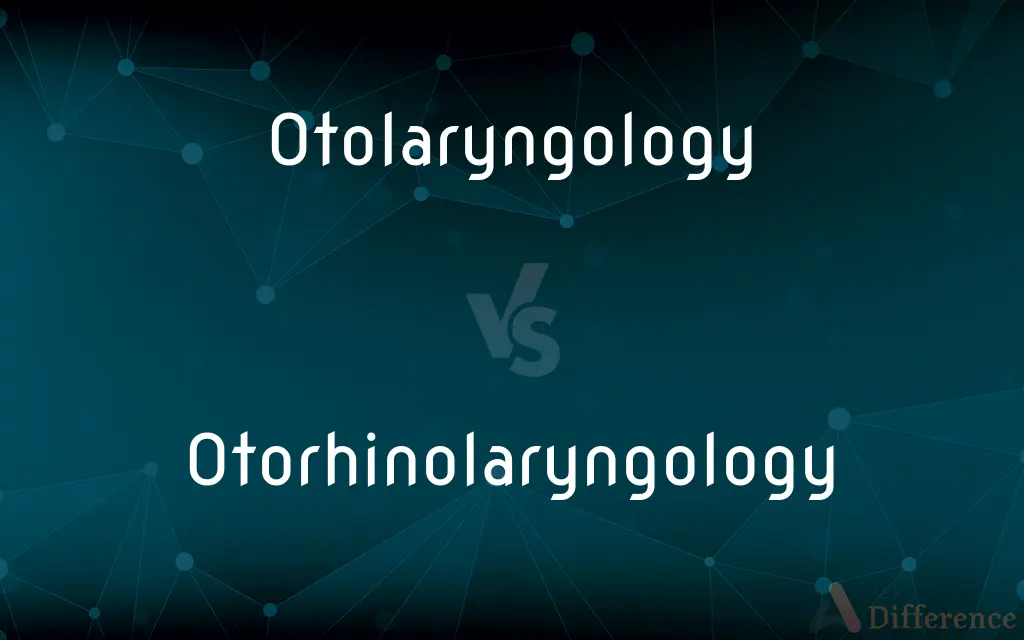Otolaryngology vs. Otorhinolaryngology — What's the Difference?
By Tayyaba Rehman — Published on October 18, 2023
Otolaryngology and Otorhinolaryngology refer to the same medical specialty dealing with ear, nose, and throat conditions, but Otorhinolaryngology explicitly includes the term "rhino" for nose.

Difference Between Otolaryngology and Otorhinolaryngology
Table of Contents
ADVERTISEMENT
Key Differences
Otolaryngology and Otorhinolaryngology both refer to a branch of medicine that deals with the diagnosis and treatment of diseases and disorders of the ear, nose, and throat (ENT). While they refer to the same field, the difference lies primarily in their composition: "Oto" stands for ear, "laryngo" stands for throat, and "rhino" stands for nose. Otorhinolaryngology includes all three components in its name.
For many, the term Otolaryngology might seem more focused due to its exclusion of "rhino." However, in practice, both terms encompass the comprehensive care of ENT issues. Otorhinolaryngology is simply more explicit in mentioning the nose's involvement in the specialty.
From a linguistic perspective, Otolaryngology is more concise, whereas Otorhinolaryngology offers a more detailed breakdown of the ENT areas covered. The latter might be preferred in settings where clarity about the nose's inclusion is crucial.
In many contexts, particularly in the U.S., the shorter term Otolaryngology is more commonly used. However, Otorhinolaryngology remains prevalent in various academic and international settings. The choice between them often comes down to regional preference, tradition, or the specific context in which it's being used.
Despite the variance in terminology, it's essential to understand that doctors specializing in this field possess expertise in all areas of the ENT, irrespective of whether "rhino" is mentioned in the term.
ADVERTISEMENT
Comparison Chart
Composition
"Oto" (ear) + "laryngo" (throat)
"Oto" (ear) + "rhino" (nose) + "laryngo" (throat)
Explicit Mention of Nose
Absent
Present
Linguistic Length
Shorter
Longer
Common Usage
More frequent in some regions
Preferred in academic/international settings
Scope of Practice
Deals with ear, nose, and throat conditions
Same as Otolaryngology
Compare with Definitions
Otolaryngology
The medical specialty concerning ear and throat.
She decided to specialize in Otolaryngology after medical school.
Otorhinolaryngology
Field diagnosing and addressing ear, nose, and throat issues.
The Otorhinolaryngology department is equipped with state-of-the-art facilities.
Otolaryngology
Branch of medicine focused on ENT disorders.
He visited an Otolaryngology clinic for his persistent earache.
Otorhinolaryngology
Comprehensive branch covering all ENT diseases.
Her research in Otorhinolaryngology has led to breakthroughs in nasal treatments.
Otolaryngology
Study and treatment of ear and throat diseases.
Otolaryngology has made significant advancements in treating voice disorders.
Otorhinolaryngology
Specialty focusing on ENT disorders and treatments.
Otorhinolaryngology encompasses surgical interventions for sinus issues.
Otolaryngology
Field dealing with diagnosis of ENT conditions.
After years in Otolaryngology, she developed innovative surgical techniques.
Otorhinolaryngology
Medical study of ear, nose, and throat conditions.
He pursued a residency in Otorhinolaryngology at a renowned institution.
Otolaryngology
Medical discipline centered on ear and throat health.
The conference on Otolaryngology showcased emerging research in audiology.
Otorhinolaryngology
Medicine's discipline dealing with ENT health.
With his vast experience in Otorhinolaryngology, he's a sought-after consultant.
Otolaryngology
The branch of medicine that deals with diagnosis and treatment of diseases of the ear, nose, and throat. Also called otorhinolaryngology.
Otorhinolaryngology
Otorhinolaryngology ( oh-toh-RYE-noh-LAR-in-GOL-ə-jee, abbreviated ORL and also known as otolaryngology, otolaryngology – head and neck surgery (ORL–H&N or OHNS), or ear, nose, and throat (ENT), is a surgical subspecialty within medicine that deals with the surgical and medical management of conditions of the head and neck. Doctors who specialize in this area are called otorhinolaryngologists, otolaryngologists, head and neck surgeons, or ENT surgeons or physicians.
Otolaryngology
(medicine) The study of diseases of the ear, nose and throat.
Otorhinolaryngology
See otolaryngology.
Otolaryngology
The branch of medicine concerned with the ear
Otorhinolaryngology
(medicine) Otolaryngology.
Common Curiosities
Does an Otolaryngologist not treat nose-related issues?
An Otolaryngologist treats ear, nose, and throat issues, irrespective of the term's composition.
Why does Otorhinolaryngology have "rhino" in it?
"Rhino" means nose, making Otorhinolaryngology explicit in including ear, nose, and throat.
Is there a difference in the practice of Otolaryngology vs. Otorhinolaryngology?
No, they both refer to the same ENT medical specialty; the difference is in the name's composition.
Is one term preferred over the other?
Otolaryngology is more common in certain regions, while Otorhinolaryngology is preferred in academic settings.
Are the training programs for Otolaryngology and Otorhinolaryngology different?
No, the training is the same, focusing on ENT conditions.
Why use the term Otolaryngology if it misses the "nose" component?
Despite missing "rhino," Otolaryngology still encompasses all ENT aspects, and its usage is often due to tradition or regional preference.
Can a clinic use both terms interchangeably?
Yes, both terms can be used interchangeably as they denote the same medical specialty.
Why might one choose to use Otolaryngology over Otorhinolaryngology?
Otolaryngology is shorter and might be preferred for simplicity or regional tradition.
Which term is older, Otolaryngology or Otorhinolaryngology?
Both have historical roots, but the choice of term often depends on regional or institutional preferences.
Are Otorhinolaryngology clinics different from Otolaryngology clinics?
No, they are the same and treat ENT conditions.
How did the terms Otolaryngology and Otorhinolaryngology originate?
Both terms are derived from Greek, with "oto" meaning ear, "rhino" meaning nose, and "laryngo" meaning throat.
Is Otorhinolaryngology a globally recognized term?
Yes, Otorhinolaryngology is recognized internationally, especially in academic circles.
Are there sub-specialties within Otolaryngology and Otorhinolaryngology?
Yes, there are sub-specialties like pediatric ENT, audiology, and rhinology.
Do patients need to be referred differently based on these terms?
No, both terms represent the same specialty, and referrals are based on medical needs, not terminology.
Are treatments offered under Otolaryngology different from Otorhinolaryngology?
No, treatments for ENT conditions are consistent regardless of the term used.
Share Your Discovery

Previous Comparison
Fuchsia vs. Hot Pink
Next Comparison
Zodiac Sign vs. Sun SignAuthor Spotlight
Written by
Tayyaba RehmanTayyaba Rehman is a distinguished writer, currently serving as a primary contributor to askdifference.com. As a researcher in semantics and etymology, Tayyaba's passion for the complexity of languages and their distinctions has found a perfect home on the platform. Tayyaba delves into the intricacies of language, distinguishing between commonly confused words and phrases, thereby providing clarity for readers worldwide.
















































